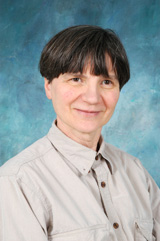 |
Oksana Lockridge, Ph.D. |
NOTE: This profile is part of a series highlighting the 26 researchers who were named UNMC Distinguished Scientists or New Investigators for 2007. Each of these researchers will be profiled in UNMC Today leading up to a March 20 ceremony to recognize their achievements.
- Name: Oksana Lockridge, Ph.D.
- Title: Professor
- Joined UNMC: 1990
- Hometown: Irvington, N.J.
Briefly describe your research in laymen terms, please.
We are developing mass spectrometry and antibody methods to detect low dose exposure to pesticides.
What led you to pursue this area of research?
Our present research is a direct outcome of our work on protection against the toxicity of pesticide poisons. A human enzyme called butyrylcholinesterase gives complete protection from these poisons. The enzyme is so effective that Pharmathene Inc. is now producing human butyrylcholinesterase in goat milk, and the Baxter company is purifying human butyrylcholinesterase from outdated human plasma for phase 1 clinical trials. Having succeeded in that part of the work, we turned our attention to a related problem, that of finding new biomarkers of exposure and of developing the new knowledge into a detection system.
How do you see your research contributing to science?
Some people become chronically ill after low dose exposure to organophosphorus pesticides. We want to find a way to diagnose their exposure and to figure out why they are sick. We hypothesize that their genetic makeup makes them susceptible to low doses of pesticides.
Why did you become a scientist?
In high school, the science courses had the reputation of being the most difficult. That reputation made them attractive to me because I wanted to prove that I could do difficult tasks. I took those courses and did well. I liked the scientific method of setting up a hypothesis and doing experiments to test the hypothesis.
What is your hope for the next generation of scientists?
I am certain the next generation of scientists will make remarkable discoveries that we can hardly imagine today. Life will become even more wonderful because of their contributions.
Beyond grant funding, how do you measure success?
Success on an individual basis is the happiness and satisfaction one feels for a job well done. The job can be helping another person get a postdoc position, helping a collaborator get his paper written, completing obligations, or the most fun of all, doing experiments in the lab.
What would you tell a student interested in a research career?
I would tell the student that a research career is a huge commitment of time. It’s not just a job, it’s a life. You have to love it, to be good.
Do you have a hero/role model? If so, what do you admire most about them?
Professor Vincent Massey at the University of Michigan in Ann Arbor is a scientist I admire. He made time to personally work in the lab every day. He did experiments himself and this gave him an understanding of experimental details that allowed him to solve problems encountered by other people in his lab. He loved working in the lab to answer scientific questions.
Tell us about your family and hobbies outside of the lab.
I enjoy making birthday cakes for the people I work with. I like to cook for my husband. Larry does not mind when I use our kitchen as an experimental food station. Recently, I tested several different ways of making caramel custard. I was trying to figure out how to avoid getting a hard layer of caramel on the bottom of the pot. Larry eats my food experiments and always says it tastes good.
List three things few people know about you.
- We are avid recyclers, which means we save old computers and old lab equipment and find ways to adapt them to new uses in the lab. We are proud of the fact that we still use two Gilford spectrophotometers manufactured in the 1960s, but have upgraded them by attaching them to computers.
- We find eBay is a good place to buy parts for old lab equipment no longer supported by the manufacturer. I have even used eBay to purchase an HPLC column at a good price.
- The old Eppley Institute, where my lab is presently, will be undergoing major renovations soon, requiring us to move out. We are scheduled to move to the new research building being built next to the Durham Research Center.